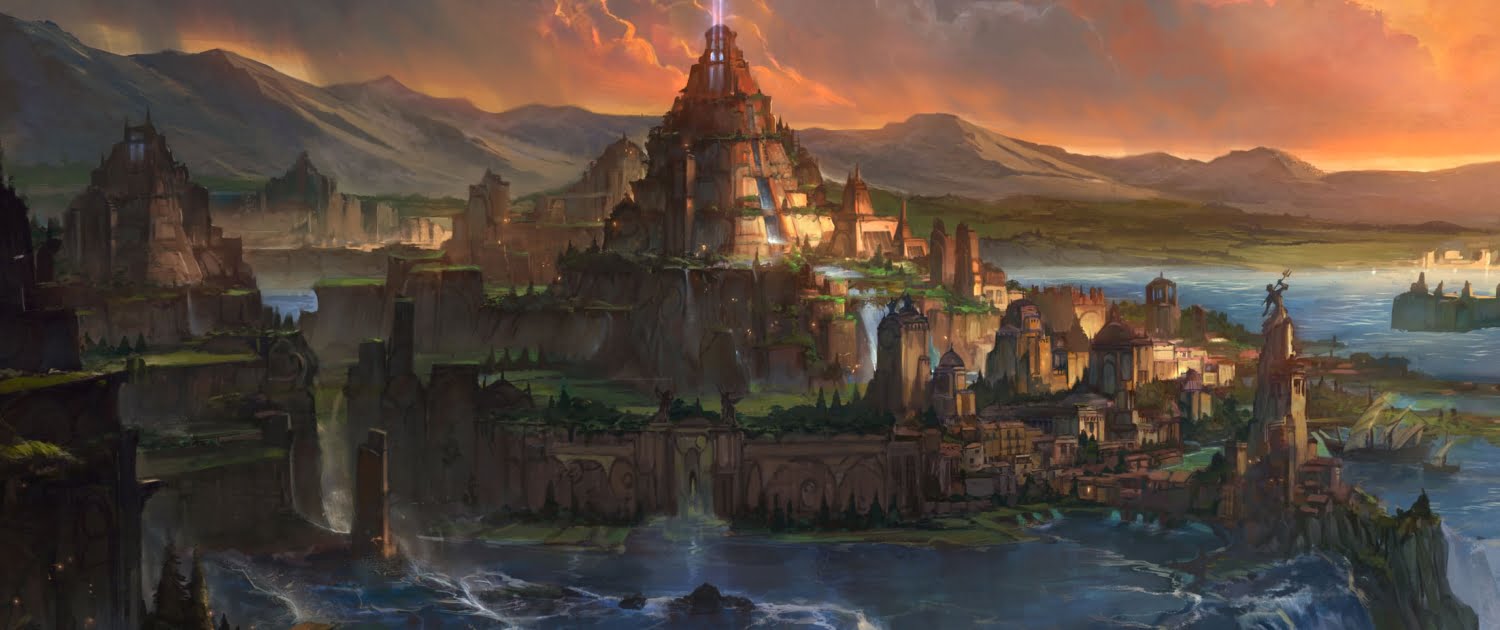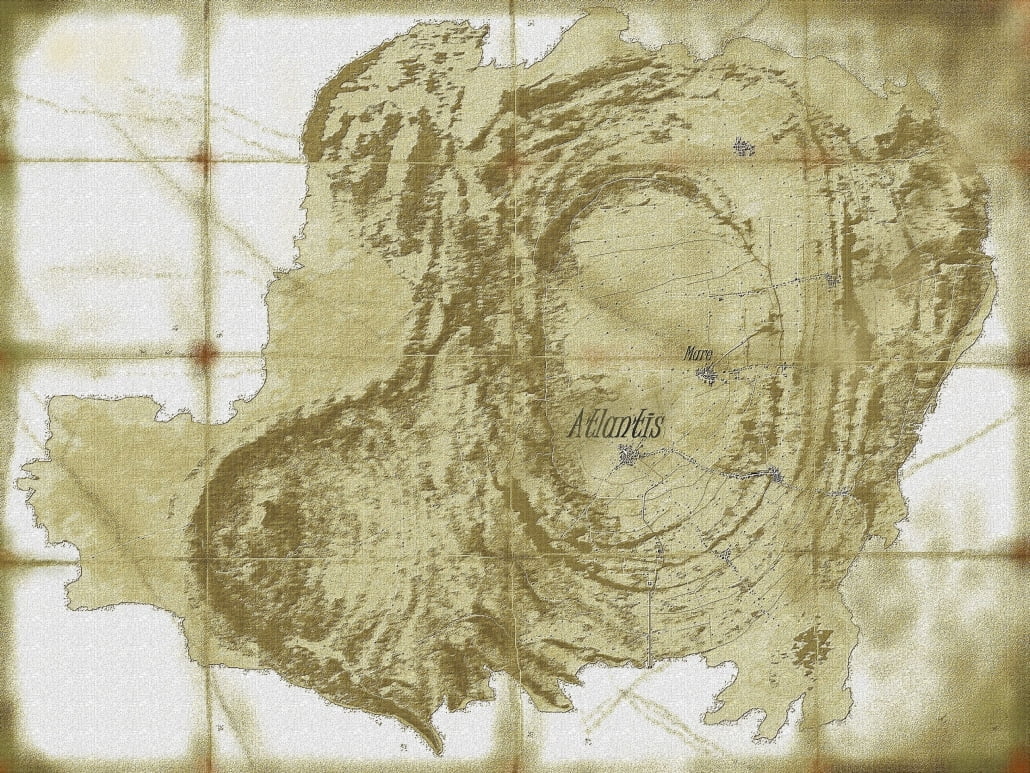Facing the Pillars of Hercules was an island larger than Africa and Europe put together. Beside this main island there were many other smaller ones, so that it was easy to cross from one to another as far as the further continent. This land was indeed a continent, and the sea was the real ocean in comparison to which “The Sea” of the Greeks was but a bay with a narrow mouth.
In the Atlantic island a powerful federation of Kings was formed, who subdued the larger island itself and many of the smaller islands and also parts of the further continent. They also reduced Africa within the Straits as far as Egypt, and Europe and as far as Tyrrhenia. Farther aggression, however, was stopped by the heroic action of the then inhabitants of Attica, who, taking the lead of the oppressed States, finally secured liberty to all who dwelt within the Pillars of Hercules. Subsequently, both places were destroyed by mighty cataclysms, which brought destruction in a single day and night. The natural features of the Attic land were entirely changed and the Atlantic island sank bodily beneath the waves.
In the center of the Atlantic Island was a fair and beautiful plain. In the center of this plain and nearly six miles from its confines was a low range of hills. Here dwelt for many generations the renowned race of the Atlan, from whom the whole island and sea were named Atlantic or Atlantis. The ruling Kings ever handed down the succession of power to their eldest sons, the younger sons going into the priesthood. They were possessed of such wealth as no dynasty ever yet obtained or will procure easily hereafter. This wealth was drawn both from all foreign nations with whom the Atlantians traded and from Atlantis itself, which was especially rich in minerals, and possessed the only known mines of orichalcum in the world, a mineral with most wonderful and inexhaustible properties – a metal which was then second only to gold in its value.
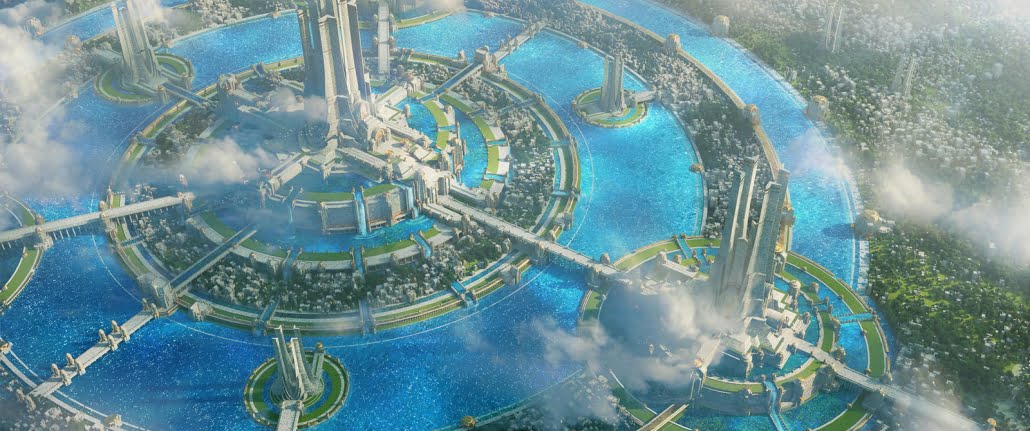
Atlantis – Aerial by OliverBeck
The country was rich also in timber and pasturage. Moreover there were vast numbers of elephants, spices, gums and odorous plants of every description; flowers, fruit trees and vegetables of all kinds, and many other luxurious products which this wonderful Continent, owing to its beneficent climate, brought forth. These were sacred, beautiful, curious and infinite in number. Nor were the inhabitants content with simply the natural advantages of their glorious country, but also displayed a marvelous industry and skill in engineering and the constructive arts. For, in the center of the island they built a royal palace, every succeeding King trying to surpass his predecessor in adorning and adding to the building, so that it struck all beholders with the greatest admiration.
They cut about the Royal Palace a series of waterways or canals. These were bridged over at intervals, while an immense canal admitted the largest vessels from the sea, giving at once protection as a harbor, and making it more convenient for the transportation of freight to and from the interior. In fashioning their interior streams they left the docks cut out of the solid rock where their triremes could land their cargoes. The stone used in their building was of three colors, white, black and red, so that many of the buildings presented a gay appearance.
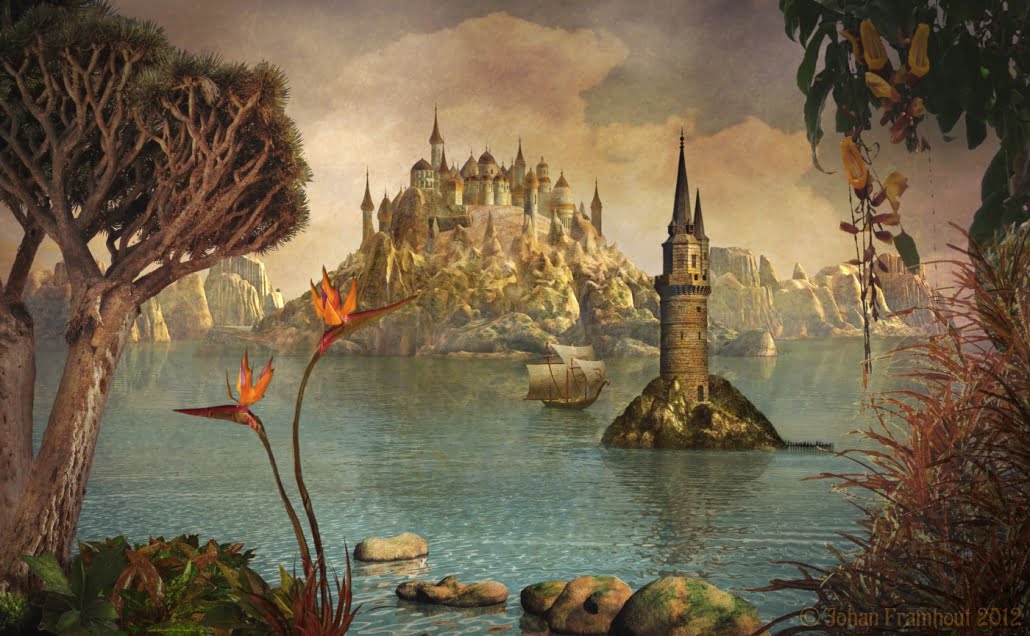
Atlantis by Nahojis
Northeast of the center of the Continent, stood the great Temple. The interior was covered with silver,except for the pediments and pinnacles, which were lined with gold. Within, the roof was a magnificent mosaic of gold, ivory and orichalcum, and all walls, pillars and pavements were covered with orichalcum.
By a system of aqueducts leading from natural springs of hot and cold water, they had supplies for baths, and for the irrigation of their beautiful plantations and gardens. The docks were filled with shipping and naval stores of every description known to men at that time. The whole city teemed with a dense population. The main canal and largest harbor were crowded with merchant shipping returning from, or making ready to sail for, all parts of the world. The din and tumult of their commerce continued all day long, and the night through as well. Such is a general sketch of their wonderful city.
Now, as regards the rest of the country; it was very mountainous with exceedingly precipitous coasts, and the plain surrounding the city was itself environed by a mountain chain broken only at the sea entrance. The plain was smooth and level and of an oblong shape, lying North and South. The mountains were said to be the grandest in the world for their number, size and beauty. The whole country was a constant succession of prosperous and wealthy villages, for there was an abundance of rivers and lakes, meadows and pasturage for all kinds of cattle and quantities of timber. They surrounded this plain with an enormous canal or dyke, 101 feet deep, 606 feet broad, and 1,250 miles in length. By it the water from the mountains was conducted around the whole plain, and while a part flowed out to the sea, the rest was husbanded for irrigation. They were able, by raising two crops a year, to double their productive capacity.
In the polity of the Atlantians the Kings maintained an autocracy and the priesthood were their council of consultation in all matters of State, until at last the power passed into the hands of the priesthood.
For many generations, the rulers, King and priest remained obedient to their ancestral traditions. For they possessed true and altogether lofty ideas and exercised mildness and practical wisdom, both in the ordinary vicissitudes of life and in their mutual relations. The looked above everything except virtue. They considered things present of small importance, and contentedly bore their weight of riches as a burden. Nor were they intoxicated with luxury, but clearly perceived that wealth and possessions are increased by mutual friendship and the practice of true virtue; whereas, by a too anxious pursuit of riches the possessions themselves are corrupted and friendship also perishes therewith. Thus it was they reached the great height of prosperity we have described.
But when, at last their mortal natures began seeking to dominate and override the Divine within and about them, they commenced to display unbecoming conduct, and to degenerate; this blighting and finally destroying the fairest of their most valuable possessions.
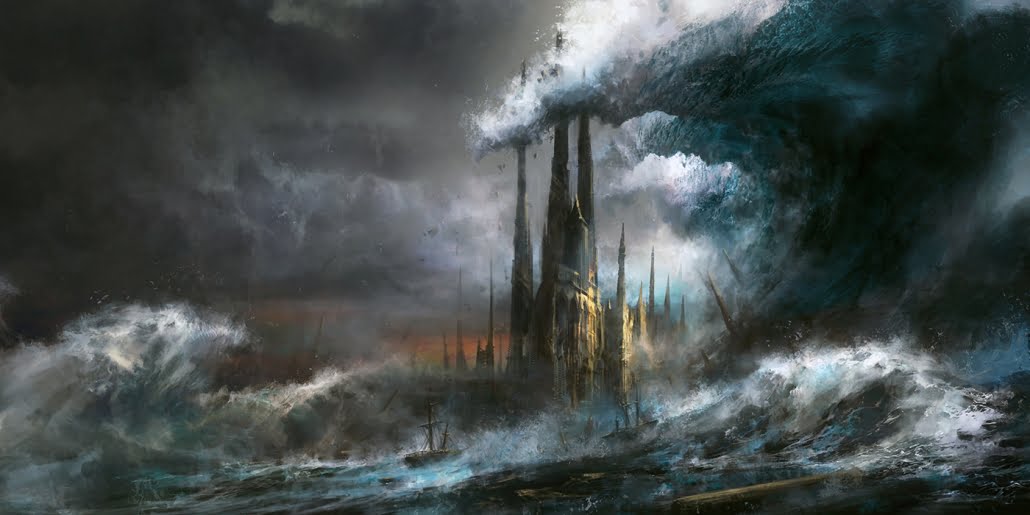
Atlantis by ChrisCold
The following is the Maya account of the destruction of Atlantis, from Dr. Augustus Le Plongeon’s rendering of the Troano manuscript:
“The year six Kan, on the eleventh Muluc, in the month Zac, there occurred terrible earthquakes, which continued without intermission until the thirteenth Chuen. The country of the hills of mud, the ‘land of Mu,’ was sacrificed. Being twice upheaved, it suddenly disappeared during the night, the basin being continually shaken by volcanic forces. Being confined, these caused the land to sink and rise several times and in various places. At last, the surface gave way, and the ten countries were torn asunder and scattered into fragments; unable to withstand the force of the seismic convulsions, they sank with sixty-four millions of inhabitants, eight thousand years before the writing of this book.”
We perceive in the near future, as has been repeatedly foretold the end of a cycle is at hand in Cataclysmic results; the sinking of land some places; and the rising in others, is imminent. When cities peculiarly situated are crowded with inhabitants, who have lost everything but their own desires centering in selfish purpose, their thought vibrations become inharmonious with the universal thought vibrations. If this disharmony continues strong enough to communicate itself to the ground upon which the city stands, this foundation being subject also, to a set of vibrations upon the natural plane of Liquidity, serious consequences may occur.
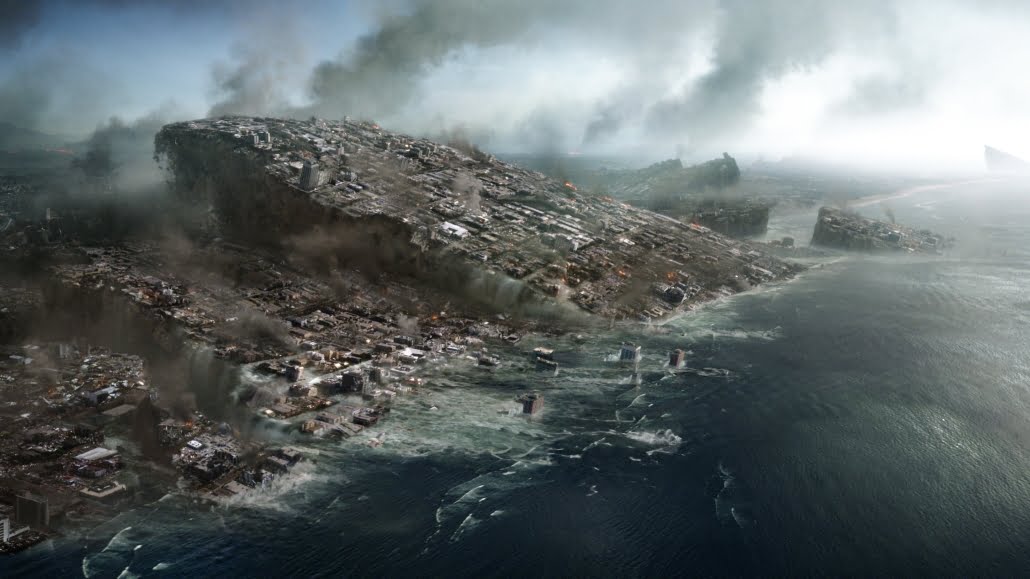
Scene from “2012” (2009)
Just what the outcome of the present period will be none but the Council of the Seven Great Builders know. But this we have gathered: That within a hundred years, and possibly a much shorter time, Atlantis will be above the waves. Whatever her monuments contain, or whatever may be in her ruined temple can be investigated. Within 500 years the bulk of the population will be south of the equator that which is now sea, will become dry land, and the old continent of Lemuria will once more sustain its millions of inhabitants. Scientists tell us that the time is fixed when all the gold, silver and coal will be mined. How short-sighted! Under the sea is a thousand-fold more than has ever been brought to light by man’s busy hands.
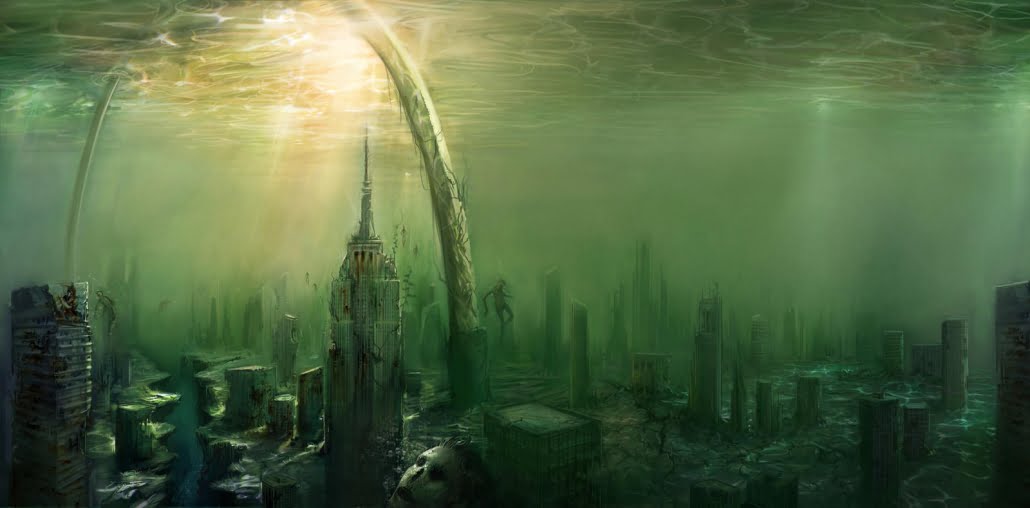
Atlantis by SoupAndButter


